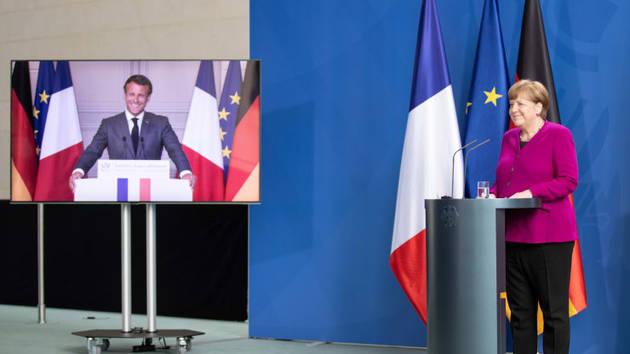A “strong political signal,” a “big step forward,” and a “historic” moment — these are just some reactions to the latest plan from France and Germany to set up a coronavirus relief fund in Europe, CNBC writes in the article Why the French-German proposal for a $545-billion relief fund is a big deal for Europe. The idea is to task the European Commission, the executive arm of the European Union (EU), to raise 500 billion euros ($545 billion) in public markets.
This money would then be used as grants for sectors and regions where the impact of the coronavirus has been most stark. The allocation of these funds would be done via the European budget — a common basket that receives contributions from all the 27 member countries and which finances projects across the region. “The plan amounts to a historic step by Germany away from its long-held opposition to mutual debt to fund other EU member states,” analysts at Eurasia group, a research firm, said in a note Monday.
In the wake of the coronavirus economic crisis, several European countries including Italy, Spain and France have pushed for “corona bonds” — a financial instrument that would combine different national debts and would be sold as one bond in public markets.
It has been fiercely opposed by nations such as the Netherlands, Austria and Germany. They argued that linking their finances to nations with very high public debts would be too risky for their own taxpayers and the plan was against European treaties.
This argument had been used before, in particular in the aftermath of the region’s sovereign debt crisis of 2011. At the time, some countries were at risk of bankruptcy and other European nations were reluctant to take on too much risk to help them.
“The German Chancellor was eager to point out … that the 500 billion euros would be debt raised by the Commission and spent through the EU budget in the normal way. Without saying so, she was making a distinction with the idea of mutual debt taken on by EU governments, or so called ‘Corona bonds’,” Eurasia analysts said.
Taking on populism
The Franco-German plan is likely to have wider political implications, including on populism. The coronavirus pandemic has sparked political infighting in Europe, with the worst-hit southern nations blaming the richer North for not doing enough the help them. This was the case in Italy, for example, where the government argued that countries such as Germany needed to do more. This political division has bolstered anti-EU rhetoric in southern nations; Italy, for example, has experienced growing support for anti-EU parties in the wake of the pandemic.
“Whether the recovery fund, if and when it is finally agreed, will help to dispel this impression and thus curtail the tail risk that a disaffected Italy may turn more euro-sceptic over time remains to be seen. But egged on by France, Germany is now taking the political risks sufficiently serious,” Holger Schmieding, chief European economist at Berenberg, said in a note.
Still some work to be done
Nonetheless, the Franco-German plan has yet to be approved by the other European countries. Austrian Chancellor Sebastian Kurz said the aid should be provided to those who need it in the form of loans not grants, as proposed by France and Germany. The European Commission is due to present more detailed plans, based on the French and German idea, next week. “It is unclear how the EU will design and ensure debt repayments and whether the proposal can secure support from the remaining EU27,” Ana Andrade, Europe analyst at the Economist Intelligence Unit, told CNBC Monday.
Any new recovery fund will have to be unanimously approved by the 27 EU countries as well as by the European Parliament, the only directly-elected EU institution. In relation to debt repayments, Andrade explained that “in the absence of new own-resources, such as a European digital or carbon tax, member-states will be responsible for debt-servicing costs. This means the effective financial relief of these transfers will have to be measured against a given country’s contribution to the fund.”






